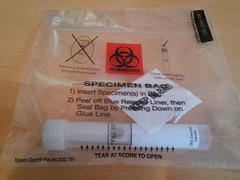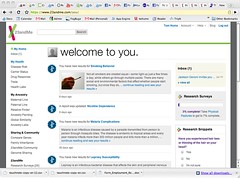In Which Tom Looks Forwards And Backwards Through His Spit
Towards the end of last year I read 59 Seconds by Richard Wiseman, a book which takes a scientific approach to debunking some self-help myths and suggests some alternative methods for motivating and incenting oneself. As part of trying these suggestions, I promised myself that if I achieved A Certain Something, I'd treat myself to a DNA test from 23andme.
I completely failed to do most of the things that would've earned me such rewards, including A Certain Something, then World DNA Day came around, 23andMe dropped their prices considerably for 24 hours only, and I bought it anyway.
 A week or so later, a rather smart-looking package arrived. Whilst the unboxing experience won't bring tears to any eyes in Cupertino, 23andMe have clearly thought through how to dress a slightly unpalatable medical process in consumer-friendly clothes. I signed up with the web site, clicking past umpteen disclaimers to promise that no, I wasn't going to consider this as medical advice and yes, I did understand that I might learn unpleasant things about myself.
A week or so later, a rather smart-looking package arrived. Whilst the unboxing experience won't bring tears to any eyes in Cupertino, 23andMe have clearly thought through how to dress a slightly unpalatable medical process in consumer-friendly clothes. I signed up with the web site, clicking past umpteen disclaimers to promise that no, I wasn't going to consider this as medical advice and yes, I did understand that I might learn unpleasant things about myself.
The dirty business of filling a tube with saliva followed. 23andMe were terribly helpful and reassuring when it came to this bit: most people apparently "take between 2 and 5 minutes to deliver a saliva sample", and I'm delighted to report that in this respect I'm absolutely average. I relaxed, rubbed my cheeks gently, and within a mere 210 seconds had delivered the required quantity of slobber. Tube sealed, packaged into a fearsome-looking "biohazard"-labelled bag, and posted back to the USA.
About 6 weeks later, The Email Arrived: my results were in. I'll confess to a small feeling of trepidation as I tapped in username and password, and dug into the data. And there's a *lot* of data.

It's broken down into what I'd consider two major sections - "My Health" and "My Ancestry" - and a couple of other bits: "Sharing & Community" and "23andWe". I zeroed in immediately onto "My Health", with bated breath... and was quietly happy with the hand it appears I've been dealt. No horrendous nasties, but a greater than average risk of the terrifying-sounding "venous thromboembolism" (blood clots basically - my dad's had this sort of trouble in the past, so no surprise) and just-slightly inflated risk of Type 2 Diabetes and colorectal cancer. Just as happily, I was pleased to read that my risks of Crohn's disease, Multiple Schlerosis and melanona are all reduced.
Best of all, I have a massively low risk of "Restless Legs Syndrome": "Imagine what it would be like to crawl into bed every night, ready to catch some much-needed Zs, only to be struck by an irrepressible urge to move your legs as soon as you began to relax. No matter how tired you were, instead of drifting off peacefully, you would be compelled to get up and move around. It may sound crazy, but this is exactly the situation people with restless legs syndrome (RLS) experience."
They lock some of the extra-frightening stuff behind additional bars. Effectively, you have to say "yes I'm sure" before you find out your risk of, say, Parkinson's. I did, and mine is no higher than normal.
I've given the ancestry side of things less attention; it's something I'll come back to, but it doesn't excite my inner hypochondriac as much as the health stuff. One really interesting titbit, though: they show you maps of where your maternal and paternal haplogroups lived 500 years ago, and do so because before that time people very rarely moved. Where your ancestors were back then is where they probably lived for a long time before. Bloody obvious of course, but we've lost that link between people and place in the last few centuries.
There are social elements to the site, too, helping you find relatives and potentially share data with them. I've said hi to a couple of 4th cousins, but I'm not interested enough in genealogy (right now) to pursue this side of things much, Maybe later.
There's also potential to contribute: surveys collect data which can then be cross-referenced with the corpus of data that 23andMe are collecting to help them pattern-match and draw their own conclusions. I get a warm fuzzy feeling from doing this myself, and even better: it's really easy. And the site regularly updates me with new things that they've learned from that tube of spit I posted them earlier in the year: either conclusions drawn from 23andMe data alone, or from external sources.
23andMe looks credible and well-researched to me, but I'm no scientist (everything I know about genetics I forgot during GCSE biology) and I wanted to get an expert opinion; so I called on a friendly quack and a chum who's qualified in genetics to see what they thought of it. They were generally positive on the presentation. There are plenty of references, many of them to reputable journals like Nature, and whilst we found one or two duplicate studies in a wander around my data, this side of things seemed solid. The conclusions which are low-confidence are labelled as such, and the site uses a credible mechanism for stating your health risks (the odds calculator compares your risk in 1000 folks of comparable ethnicity to the average). The quack pondered on how much of the illness risk came from genes and how much from environment, and the geneticist made some very detailed arguments (which I can't fully recall well enough to express them meaningfully here) about how conclusions couldn't be realistically drawn from looking at specific SNPs.
For myself, I don't feel that my taking these risks seriously carries any risk in itself: the health advice given is good, common-sense stuff: mention PVT to doctors before having an operation, get screened for cancer when I turn 50, exercise, keep my weight down, drink moderately, eat reasonably, don't smoke... all things one should do anyway.
A few people I've spoken to about this have raised privacy concerns: how do I feel about having this data known about me? What if it falls into the wrong hands? I've realised I feel oddly detached from it: my genomes and the conclusions you can draw from it may be the most personal information that exists about me anywhere, but it's so close-up and mechanical that I don't really feel I need to keep it private. It's a bit like showing your friends photos of your genitals: if they've been taken with an electron microscope, they're not porn any more and it's OK.
23andMe let you download your raw genome data; after some experiments generating sound from various data source last year, this got my cogs whirring. I have a really strong desire to make a game which involves exploring my genes, I need to have a think about that one.
How much raw genetic data am I? 5 megabytes, zipped. That's a humbling quantity; you can fit 200 of me onto a cheapo USB stick. On the bright side, the unzipped version is about 15 megabytes. Turns out I'm significantly less redundant than the English language :)